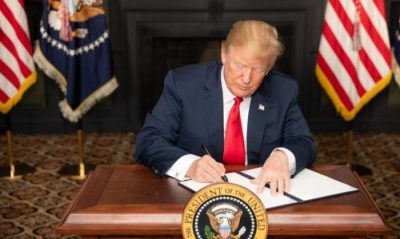A Foreign Affair: Trump’s Dominican Republic Deal

Donald Trump is pursuing what appears to be a new business deal in the Dominican Republic despite pledging no new foreign deals – a deal which may be in violation of the U.S. Constitution
***
Almost two years after Donald Trump pledged to the American people that he would make no new foreign deals while president, our undercover investigation into the Trump family’s activities in the Dominican Republic reveals that the Trumps may be pursuing a new real estate deal in the country.
This opens the door to corruption and conflicts of interest risks as the President has not fully divested from his business.
In response to our investigation, the Trump Organization now deny that they are involved in any current project in the Dominican Republic.
Acting in whose interests?
The fact that President Trump continues to pursue private business while in office poses a major conflict of interest – it is unclear whether he is making policy decisions in the interest of the American people, or for his own financial benefit.
The Trump Organization’s business in the Dominican Republic raises questions about the relationship between the U.S. president and Dominican officials. If Dominican officials made decisions that would result in a benefit or profit from Trump and his business in the Dominican Republic, it could be against the U.S. constitution.
A new deal – but not the first in the Dominican Republic
This is not the first time the Trumps have pursued a real estate deal in the Dominican Republic’s Cap Cana resort. Nor is it their first time partnering with the Hazourys, a wealthy, well-connected Dominican family working in real estate.
The Trumps and Hazourys initially partnered up in 2007, with a plan to build mansions in 68 lots along the cliffs of Cap Cana.
Soon after, the global financial crisis hit and the project went south. Construction never even got off the ground and investors and prospective property buyers lost millions. The area where mansions were once marketed by the Trumps is now overgrown with weeds.
Trump’s company later sued the Hazourys and their company for not paying them the agreed fees in their 2007 licensing deal. They also alleged that the Hazourys committed “text book fraud on such a wide scale.” The Trumps later received cash and two pieces of properties as in kind payments worth millions under their 2013 settlement agreement .
Nearly a decade later, the Trumps have returned to the Cap Cana resort and are back in business with the Hazourys.
Previously, the Trump Organization and Hazourys have claimed that the project is a continuation of their old deal, most likely to avoid contradicting President Trump’s pledge to separate himself from his business, and more specifically to pursue no new foreign deals while in office.
However, Global Witness evidence suggests that the deal is indeed new. Hallmarks of a new deal include, among others, a potential change in Trump’s role as developer instead of licensor, and the fact that the new and previous projects are not even close to one another – they are five miles apart.
Why is the President able to pursue business while in office?
While it is not illegal for Trump to run a private business while in office, Cabinet members and senior administration officials are required by law to fully divest from any private financial interests that may intersect with their professional duties. The vice president and president of the United States are exempt from these rules.
Our new investigation underscores the need for a comprehensive conflict of interest law that holds both the president and vice president accountable to the American people. As his own lawyer stated ahead of his inauguration: “any new deal could — and I emphasize could — be perceived as causing a conflict or as exploiting the office of the presidency.”
EXPOSED 📣Trump broke his promise. We went undercover to show how President Trump is moving ahead with what looks to be a new business deal in the Dominican Republic, despite his "no new foreign deals" pledge. Watch and share! #TrumpDeals https://t.co/0HbubecsQk pic.twitter.com/A2Nz10JkYc
— Global Witness (@Global_Witness) December 17, 2018
*
Note to readers: please click the share buttons above. Forward this article to your email lists. Crosspost on your blog site, internet forums. etc.
Featured image is from Strategic Culture Foundation

